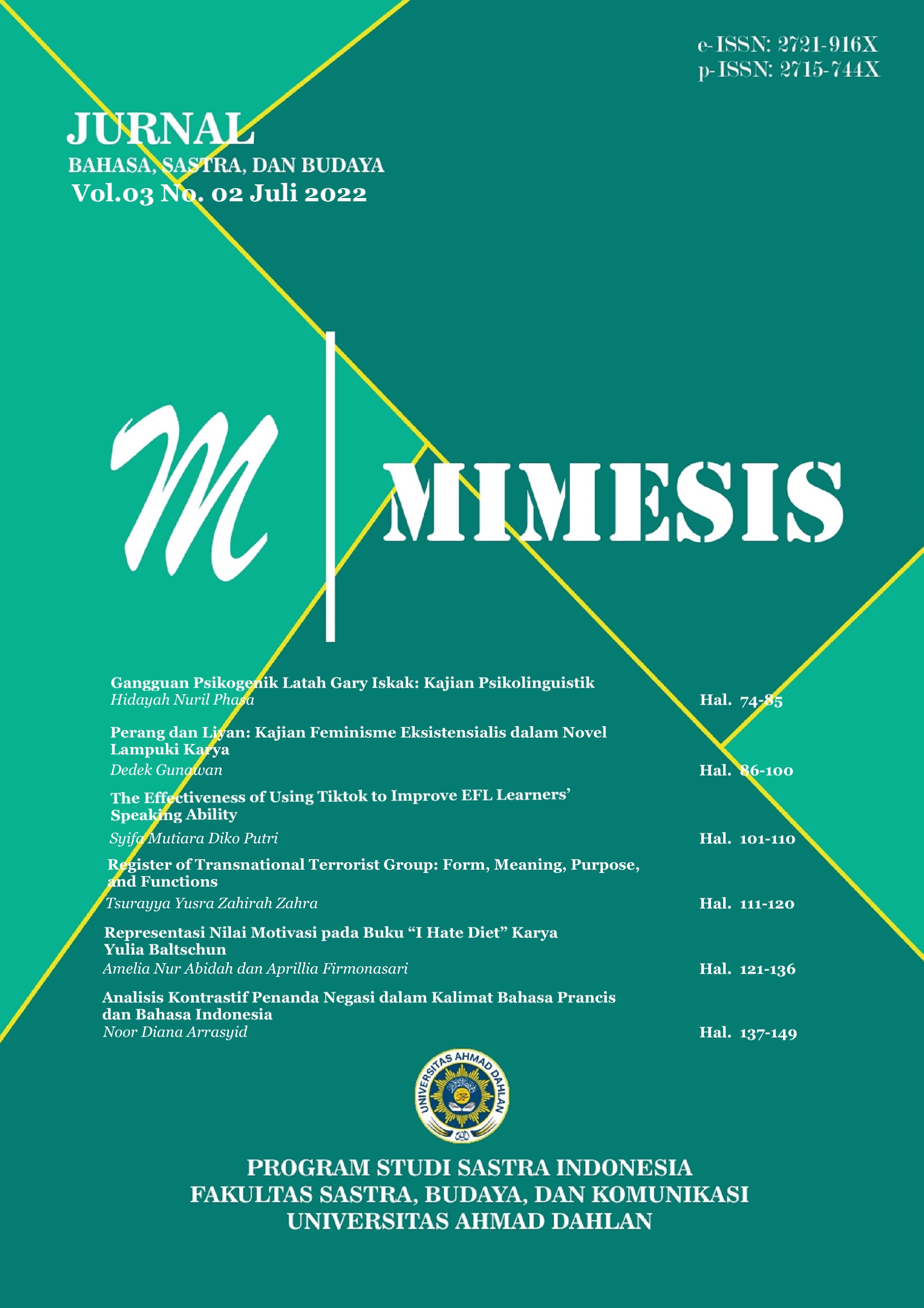REGISTER OF TRANSNATIONAL TERRORIST GROUP: FORM, MEANING, PURPOSE, AND FUNCTIONS
DOI:
https://doi.org/10.12928/mms.v3i2.6236Keywords:
Al-Qaedda, ISIS, Register , Sociolinguistics , TerrorismAbstract
The register is a language variation that can become the identity of a community group. The register is also a marker of an individual a member of a particular community group. One of them is the register used by terrorist groups. Indonesia has detected two streams of transnational terrorist groups in this country, namely ISIS and Al-Qaeda. The Sociolinguistics studies specification in the uses of registers by the two terrorism groups investigated using a qualitative descriptive method. This research takes the main sources from the electronic news platform and channel belonging to one of the suspected terrorist groups. The results showed that there were differences in the form of language selection in the use of registers in each group. In addition, the analysis of the use of terrorist registers from the two groups also clearly shows the intent and purpose of using the registers. Through this research, researcher hoping that the community can increase awareness and sensitivity to all social processes around them, especially in the process of speech acts in the community, by not ignoring linguistic signs that they do not know.
References
Adida C, Laitin D, Valfort M-A. 2010. Identifying barriers to Muslim integration in France. PNAS 107:384–90.
Ariyanto, Y. (2017). 5 Jejak ISIS dalam Aksi Teror di Indonesia. https://www.liputan6.com/news/read/2968002/5-jejak-isis-dalam-aksi-teror-di-indonesia. Diakses pada 11 Maret 2022, 10:41 PM.
Atran, S. (2021). Psychology of transnational terrorism and extreme political conflict. Annual review of psychology, 72(1), 471-501.
Biber D, Conrad S. (2009). Register, genre, and style. Cambridge: Cambridge Univ Press.
Chaer, A, L. Agustina. (2010). Sosiolinguistik: perkenalan awal: Edisi Revisi. Jakarta: Rineka Cipta.
Di Filippo, M. (2020). The definition (s) of terrorism in international law. In Research handbook on International law and terrorism. Edward Elgar Publishing.
Fitriyah, M., & Kurniawan, M. A. (2018). Register dalam Interaksi Waria di Kabupaten Lombok Timur. SeBaSa, 1(1), 54-62.
Ramadhyas, A. R. (2020). Menelaah aksi penargetan dan pola strategi penyerangan terorisme. Journal of Terrorism Studies, 2(1), 5.
Rosand, E. (2003). Security Council resolution 1373, the counter-terrorism committee, and the fight against terrorism. American Journal of International Law, 97(2), 333-341.
Scharf, M. P. (2004). Defining terrorism as the peacetime equivalent of war crimes: problems and prospects. Case W. Res. J. Int'l L., 36, 359.
United Nations. (1999). International Convention for the Suppression of the Financing of Terrorism.
Downloads
Published
Issue
Section
License
Copyright (c) 2022 Tsurayya Yusra Zahirah Zahra

This work is licensed under a Creative Commons Attribution-ShareAlike 4.0 International License.
License and Copyright Agreement
In submitting the manuscript to the journal, the authors certify that:
- They are authorized by their co-authors to enter into these arrangements.
- The work described has not been formally published before, except in the form of an abstract or as part of a published lecture, review, thesis, or overlay journal.
- That it is not under consideration for publication elsewhere,
- That its publication has been approved by all the author(s) and by the responsible authorities tacitly or explicitly of the institutes where the work has been carried out.
- They secure the right to reproduce any material that has already been published or copyrighted elsewhere.
- They agree to the following license and copyright agreement.
Copyright
Authors who publish with Mimesis agree to the following terms:
- Authors retain copyright and grant the journal right of first publication with the work simultaneously licensed under a Creative Commons Attribution License (CC BY-SA 4.0) that allows others to share the work with an acknowledgment of the work's authorship and initial publication in this journal.
- Authors are able to enter into separate, additional contractual arrangements for the non-exclusive distribution of the journal's published version of the work (e.g., post it to an institutional repository or publish it in a book), with an acknowledgment of its initial publication in this journal.
- Authors are permitted and encouraged to post their work online (e.g., in institutional repositories or on their website) prior to and during the submission process, as it can lead to productive exchanges, as well as earlier and greater citation of published work.












